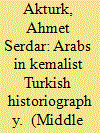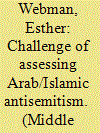| Srl | Item |
| 1 |
ID:
101799


|
|
|
|
|
| Publication |
2010.
|
| Summary/Abstract |
Depictions of Arabs and Islam in the Turkish historiography of the 1930s clearly indicate the secular and nationalist character of the new Turkish republic. However, if one looks at the official publications from the 1930s and 1940s, not only the textbooks, the image of Arabs and Islam does not appear simple and coherent. This article reviews the image of Arabs and Islam in Kemalist Turkish historiography and demonstrates the diverse and sometimes conflicting depictions with reference to the various official texts.
|
|
|
|
|
|
|
|
|
|
|
|
|
|
|
|
| 2 |
ID:
101801


|
|
|
|
|
| Publication |
2010.
|
| Summary/Abstract |
The object of this article is to introduce a careful reading of Arab/Islamic anti-Semitism in view of the conflicting approaches to its assessment. Three aspects are covered: the origins of this anti-Semitism and its relation to the Arab-Israeli conflict; the impact of Nazism on Arab/Islamic anti-Semitism; and the place of anti-Semitism in the ideology of Islamist movements, highlighting a much neglected feature - the Arab discourse on Arab/Islamic anti-Semitism. It contends that the image of the Jew as an irredeemably destructive, conspiratorial agent, hostile not only to Arabs and Muslims but to humanity at large, is a relatively new phenomenon, gradually striking roots especially among Islamists.
|
|
|
|
|
|
|
|
|
|
|
|
|
|
|
|
| 3 |
ID:
101804


|
|
|
|
|
| Publication |
2010.
|
| Summary/Abstract |
The article describes and probes the initial experiments in laying railroad tracks in northern Palestine during the second half of the nineteenth century and presents the construction phases of Haifa Station. Considering the period, the intentions of the various railroad planners exhibited outstanding vision. Even though the first trials failed, they remained determined and, above all, they succeeded in proving that railway projects were feasible. For this reason the Jezreel Valley railway project was considered a tremendous achievement for that period. The station built in Haifa, the largest and most important of the stations, became an impressive and representative symbol of a project of imperial scale.
|
|
|
|
|
|
|
|
|
|
|
|
|
|
|
|
| 4 |
ID:
101803


|
|
|
| 5 |
ID:
101802


|
|
|
| 6 |
ID:
101800


|
|
|
|
|
| Publication |
2010.
|
| Summary/Abstract |
A famous quote, 'Arab leaders don't give a damn whether the refugees live or die', attributed to an UNRWA official called 'Ralph Galloway', is examined. The real author was Lt. General Sir Alexander Galloway, who was briefly an UNRWA official in Jordan during 1951-52. Galloway's career is reviewed along with the circumstances of his brief tenure with UNRWA. He clashed with the Jordanian government over control of the organization during a period of economic crisis and was eventually fired at their request. Galloway's statement was made to visiting American clergy but Zionist writers recopying earlier sources lost Galloway's identity. The historiography of the quote is discussed along with the implications of Galloway's true identity for understanding the history of UNRWA.
|
|
|
|
|
|
|
|
|
|
|
|
|
|
|
|